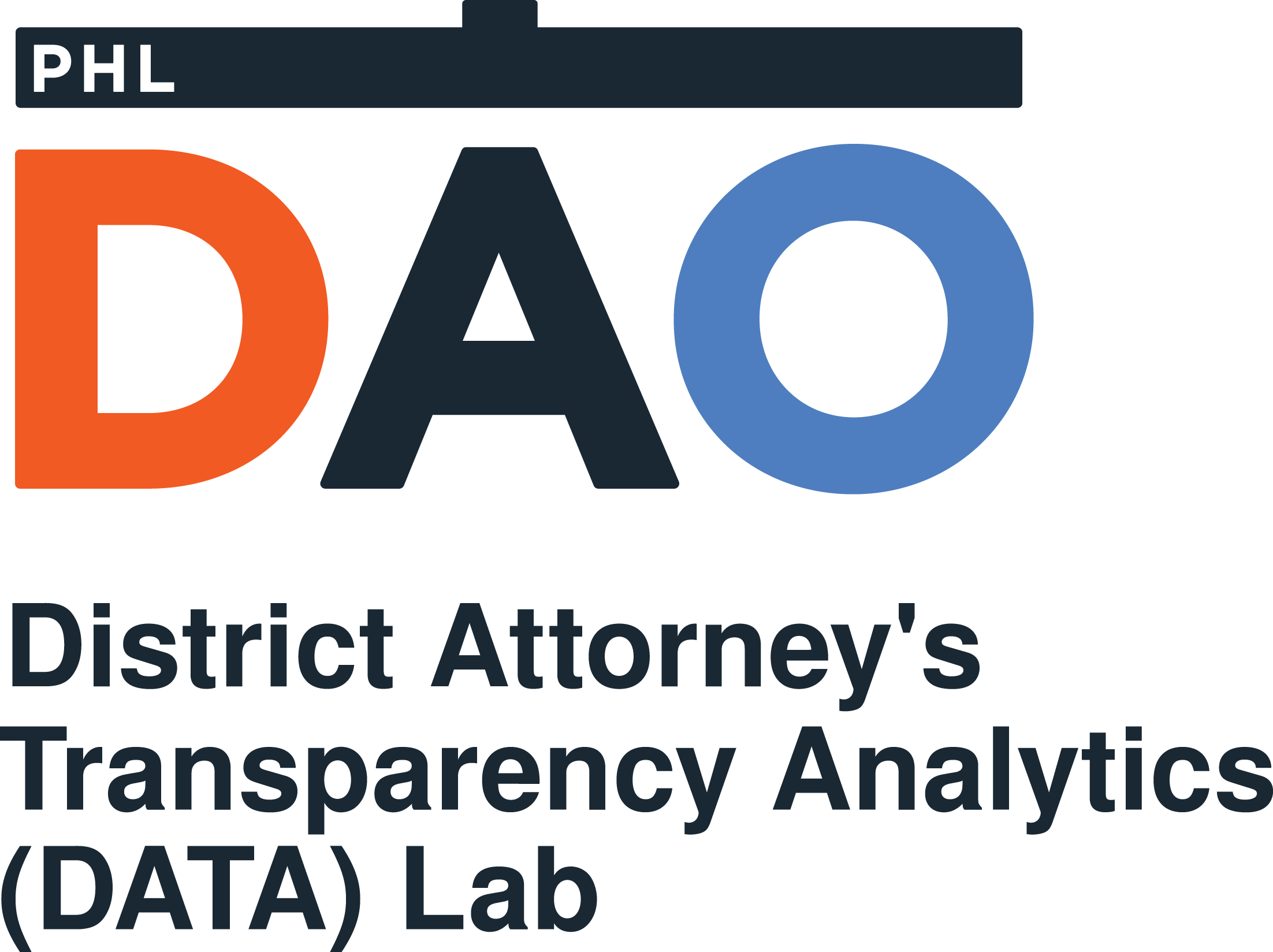Research at the DAO - PhilaDAO Data Dashboard
Research at the DAO
The DATA Lab at the Philadelphia District Attorney’s Office (DAO) uses police, court, and other data streams to support a wide range of research on the criminal legal system. Following are DAO DATA Lab grant-funded partnerships, DAO research publications and published and ongoing studies with research partners. We work with external partners across all phases of the research arc to help develop impactful interventions, evaluations, and scholarship. This includes discussions around data sharing, data use agreements, and facilitating research involving Assistant District Attorneys (ADAs) and DAO personnel.
The DAO DATA Lab was created by District Attorney Krasner to help the Philadelphia District Attorney’s Office and the criminal legal system end the era of mass incarceration and mass supervision, and to ensure transparency and accountability while doing so. During a time of rapid change in the criminal legal system, the DATA Lab supports research that aligns with the following principles:- Provide external evaluation of DAO decisions, processes, and policies
- Investigate racism, sexism, classism, and other systemic disparities in the criminal legal system
- Involve and center communities most impacted by criminal legal system
- Improve the day-to-day functioning of the DAO (e.g., training, case processing, work product)
- Offer potential long-term benefits to DAO (e.g., process, maps, reports, code)
- Complement DAO resources and helping to better understand social problems and the role of DAO
- Address research questions of immediate interest or specific need and help fill gaps in social science research
- Work with investigators who are subject-matter experts on topic(s) of inquiry
Submit a Research Request
If you have any comments or questions, please email Director of Research Oren Gur, PhD (oren.gur@phila.gov).
Grant-Funded Partnerships
|
Geospatial Analysis of Legal Financial Obligations (LFOs) in Philadelphia
|
Researchers: Dr. Jordan Hyatt, Dr. Kathleen Powell, Dr. Clare Strange (Drexel University); Dr. Nate Link (Rutgers University); Dr. Brian Lawton (John Jay College of Criminal Justice)
Legal financial obligations (LFOs) encompass a range of costs, surcharges, fines, fees, and restitution imposed on individuals during the justice process. Recent academic and policy discussions have highlighted the negative impacts of LFOs on individuals, including increased potential for recidivism, prolonged justice involvement, and financial hardship. However, questions remain about the broader community-level distribution of LFOs and the associated, wide-ranging effects of these financial burdens. This research explores the nature of the geographical and temporal distribution of LFOs in Philadelphia. This is the first in a series of reports that aims to examine the geospatial distribution of Legal Financial Obligations in Philadelphia and its correlation with other important community-level trends, each with increasing granularity and specificity. The study is part of a larger project investigating the multifaceted impacts of LFOs on both individuals and communities.
This study is supported by Arnold Ventures and The City of Philadelphia.
This report presents a geospatial analysis of legal financial obligations assessed within Philadelphia County over a ten-year period. The findings highlight significant disparities in the distribution of LFO debt across Philadelphia, disproportionately affecting economically disadvantaged areas, areas with higher crime rates, and areas with larger Black and Latino populations.
Close
Copy Link
|
Measuring the Impacts of Juvenile Diversion Program Expansion in Philadelphia and Montgomery Counties: A partnership with Drexel University’s Juvenile Justice and Reform Lab, supported by Arnold Ventures
|
Researchers: Dr. Naomi Goldstein, Dr. Amanda NeMoyer (Drexel University, Juvenile Justice and Reform Lab)
An evaluation of the short and long-term effectiveness of recent reforms to Juvenile Diversion programs in Philadelphia and Montgomery Counties.
$15,000 to the Philadelphia District Attorney’s Office (total award $486,911)
In 2020, both the Philadelphia District Attorney’s Office and another prosecutors’ office in Pennsylvania expanded eligibility for their juvenile diversion opportunities and made more services available to eligible youth. To investigate the effectiveness of these policy changes, Drexel researchers from the Juvenile Justice Research and Reform (JJR&R) Lab will compare pre- and post-reform outcomes from both offices to those of other Pennsylvania counties. The JJR&R Lab will also work with diversion case management service providers Philadelphia Anti-Drug/Anti-Violence Network and Family Services of Montgomery County to administer surveys to youth about their perceptions of reformed programs. The study will assess program implementation and success by exploring:
- How many youths entered and completed diversion programs during similar time frames before and after reform, as well as whether net-widening has occurred
- Whether the racial distribution of youths who enter and complete these diversion programs changed from before to after reform
- Whether youth diverted before and after program reforms re-entered the criminal legal system within two years of their diversion
Close
Copy Link
|
CoLab Initiative
|
Director: Tyrell Mann-Barnes
Data CoLab is a data-driven initiative guided by principles of community-based participatory research. Community-based participatory research is a collaborative approach to research that enables community stakeholders and researchers to co-own and co-direct research activities. This approach centers equity, power sharing, and community expertise and needs. This model emphasizes the research-to-action pipeline to create evidence-based, community-driven interventions.
$1.7 million over 3 years to DAO and community partners
Thanks to a Violence Intervention & Prevention grant awarded by the Pennsylvania Commission on Crime & Delinquency (PCCD), the DATA Lab will be continuing and expanding its efforts to support community-led research and prevention strategies in areas most affected by gun violence. Based on an analysis identifying more than 89 blocks with 10 or more shootings since 2015, along with additional analysis of place-based interventions, the Data CoLab will focus on 4 neighborhoods in the City of Philadelphia, including, (1) Germantown, (2) North/Kensington, (3) Southwest and (4) West. We will work with eight partners across these four neighborhoods. Through DATA CoLab, the DAO is able to enhance community partners’ capacity to use data for programming and advocacy efforts, as well as elevate the experiences and needs of community members across the city to inform DAO data analysis. Through neighborhood-focused initiatives, the DATA CoLab is able to prioritize the voices and needs of communities by amplifying the efforts of community partners.
Close
Copy Link
|
Investigating long-term outcomes of Focused Deterrence and Cure Violence in Philadelphia: A partnership with Temple University supported by the Fund for a Safer Future.
|
Researchers: Caterina Roman, Nicole Johnson (Temple University). Kevin Wolff (CUNY John Jay College)
A follow-up study to better understand unanticipated and longer-term impact of gun violence prevention programs implemented in Philadelphia in the last decade.
$100k to DAO, $100k to Temple/John Jay
In the last decade the City of Philadelphia has implemented two of the most
well-known community-level gun violence strategies in the US: the Cure
Violence Public Health Model and Focused Deterrence (also known as Group
Violence Intervention). This project builds on prior research on these
topics to answer the following research questions:
(1) For Focused
Deterrence, how does the specific deterrence aspect of arrest and
incarceration compare to those arrested/sentenced under business-as usual
conditions (individuals in the comparison group arrested during the same
period from other parts of the city)?
(2) How do the interventions
differentially influence clearance rates over time (defined as shootings
cleared by arrest-to-prosecution)?
(3) Did the density / concentration of
shootings in census tracts with 2013 shooting hotspots change between 2013
and 2017? Have new hotspots emerged?
Changes also will be assessed
against other shooting hotspots from neighborhoods without evidence-based
interventions in 2013. This study fills a gap in the literature by exploring
the application of “specific deterrence” and the impact of the actual legal
punishment on those who are apprehended. We will also advance the evaluation
literature by examining the impact on clearance rates and long-term outcomes
for individuals and communities.
Close
Copy Link
|
A researchable prosecutorial office in the criminal justice reform era: A partnership with the University of Pennsylvania and Temple University supported by Arnold Ventures and the Chan Zuckerberg Initiative
|
Researchers: Greg Ridgeway, Aurélie Ouss, David Abrams, Aaron Chalfin, Paul Heaton, Charles Loeffler, Francesca Amaral, Miguel Garza-Casado, Viet Nguyen, Lee Ozier, Lindsay Graef, Julia Reinhold (University of Pennsylvania). Peter Jones, Jeffrey T. Ward, E. Rely Vîlcică, Caterina G. Roman, Cathryn Rosen, Cheryl Irons, Doris Weiland (Temple University)
The DATA Lab and DAO are working with independent researchers at the University of Pennsylvania and Temple University to investigate the impacts of ADA discretionary decision-making and prosecutor-led criminal legal reform. Funded by the largest research grant in the history of the DAO, this private-public collaboration with local universities aims to study the short- and long-term impacts of prosecutorial decision-making on individuals, families, and communities in Philadelphia.
$4.5M over 3 years to DAO, $2.2M over 3 years to Penn Criminology and Temple Criminal Justice
Research partners from Penn’s Department of Criminology will focus on the quantitative impacts of reforms on a broad scope of prosecutor touchpoints, while research partners from Temple University’s Department of Criminal Justice will utilize mixed methods to study the implementation fidelity of new policies and practices. This unique partnership will:
- Improve existing data systems and bolster the DAO’s data analytics and programming capacity
- Establish a local and national hub for research on prosecutorial decision-making, data-informed policy, and analytical innovations
- Investigate racial and other disparities in the criminal legal system
- Consider the relationship between criminal legal system contact and broader outcomes related to social and economic health
- Engage with DAO personnel and actors across Philadelphia’s criminal legal system
- Examine the efficiency and effectiveness of policy and programmatic changes made within the DAO
- Provide accountability and transparency both internally and to the public
Close
Copy Link
DAO Publications
|
Traffic Fatalities Brief Report: Incidents, Arrests, and Cases in Philadelphia From 2014-2024
|
A report examining traffic fatality incidents, arrests, cases, and case outcomes over a 10-year period in Philadelphia.
Abstract: This brief report examines trends in traffic fatalities in Philadelphia since 2014 and summarizes initial findings on related criminal cases. While multiple public reports, such as Vision Zero PHL and the Pennsylvania Department of Transportation’s Crash Facts & Statistics reports, highlight traffic deaths, this report focuses on the connection between these incidents and any resulting arrests or criminal charges brought by the District Attorney’s Office (DAO).
Close
Copy Link
|
2023 RACIAL INJUSTICE REPORT: Disparities in Philadelphia’s Criminal Courts from 2015-2022
|
Report Press Release Web Story
A report quantifying racial disproportionalities and disparate outcomes observed at multiple stages of a criminal case, using Philadelphia police, DAO, and court data spanning 2015 to 2022
Addressing racial injustice is among the most important goals of criminal justice reform. In Philadelphia and throughout the U.S., the negative impact of the legal system has fallen most heavily on Black communities. This report begins with a historical review, followed by a presentation of the data, and concludes with a discussion of future policy directions. The analysis, conducted by the District Attorney’s Transparency Analytics (DATA) Lab, encompasses over 290,000 cases charged from 2015-2022 and focuses on five main stages of a criminal case: 1) stop and arrest, 2) charging, 3) bail and pre-trial detention, 4) case outcomes, and 5) sentencing and incarceration.
The data confirmed that while overall the system is shrinking, and far fewer Black and Latinx Philadelphians are arrested and incarcerated now than in 2015, significant disparities remain. During the study’s 8-year timeframe, Black Philadelphians were overrepresented at nearly every stage of the system compared to white and AAPI Philadelphians. Black Philadelphians were stopped and arrested at disproportionately higher rates than other groups, charged with more serious offenses, less frequently released pre-trial, and finally, when convicted, were more likely to be sentenced to incarceration. For charges alleging possession of drugs with intent to distribute, Latinx individuals were charged at a rate that was 12 times higher than white individuals. Other disparate trends were observed at nearly every stage of analysis. The historical research and data findings strongly suggest that disparities in the criminal legal system are driven by structural inequalities in society, such as concentrated poverty and widespread community disinvestment. The report concludes with a discussion of future policy directions to be taken by this office and other justice stakeholders.
Close
Copy Link
|
100 Shooting Review Committee Report
|
Report Press Release View DAO Excerpts
A report on increased gun violence, homicide, and access to firearms in the City of Philadelphia co-authored by the DAO, Philadelphia Police Department, Department of Public Health, and Defender Association.
Firearm violence in Philadelphia is a public health and racial justice crisis. In this report agencies provide analyses and recommendations on how to address the increase in homicides, shootings, and access to firearms in Philadelphia. Collectively, we present 16 key findings and 27 recommendations. Key findings focus on what we know about shootings, including information on arrest and case processing. Recommendations identify opportunities to improve enforcement, intervention, and prevention. In addition, the DAO, led by the District Attorney’s Transparency Analytics (DATA) Lab, offer in-depth analyses on 1) improving shooting clearance rates, 2) improving gun case outcomes, 3) deterrence of illegal firearm possession, and 4) improving victim and witness appearance rates. We then offer recommendations on those same themes, and on preventing gun violence in the community more holistically. This report offers a framework, findings, and recommendations, but does not constitute a comprehensive plan; we hope it can help inform a broad citywide strategy to address gun violence through law enforcement and much more.
Close
Copy Link
|
Ending mass supervision: Evaluating reforms in the Philadelphia District Attorney's Office
|
An assessment documenting reductions in community supervision lengths under two DAO policies. Racial disparities in sentencing decreased and the reforms were implemented without increases in re-charge rates.
Abstract: Probation and parole – commonly called community supervision – can be less restrictive alternatives to incarceration, but overly lengthy supervision terms are harmful to the defendant and to public safety. Community supervision rates in Pennsylvania and Philadelphia are particularly high: at the beginning of District Attorney Krasner’s term, 1 in 23 adults in Philadelphia was on community supervision. This evaluation documents two policies to end mass supervision that were implemented in the Philadelphia District Attorney’s Office. Under the policies, median supervision lengths decreased by 12 months (a 25% reduction) for felony negotiated guilty pleas and 3 months (a 33% reduction) for misdemeanor negotiated pleas. Prior to the policy changes, white defendants received supervision sentences that were almost 11 months shorter than Black defendants’, on average. The policy reduced the disparity to 5.2 months, a more-than-50% reduction. The policies were implemented without an increase in recidivism: there was no measurable change in re-charge rates between people sentenced under the policies and those sentenced beforehand. The DAO has made progress, but collaboration by all system actors and lawmakers across the Commonwealth is necessary to end mass supervision in Pennsylvania.
Close
Copy Link
|
Prosecutor-led bail reform: Year one
|
A DAO evaluation of bail reform implemented by the DAO in 2018 showing that the policy reduced the use of cash bail without impacting recidivism or court appearance rates. The wide-ranging policy applied to over three in five charges, allowing approximately 1,750 additional Philadelphians to be released without cash bail in 2018, and was implemented at no cost. (See Ouss and Stevenson in Published Studies for more).
Abstract: The use of cash bail and pretrial detention disproportionately impacts people living in poverty and people of color, influencing the trajectory of legal cases, and is a driver of mass incarceration. Fifty days into DA Krasner’s administration, the Philadelphia DAO implemented a new policy targeting 25 charges where an analysis of historical data showed the courts had been setting bail very low— requiring payment of less than $1,000. For these specific charges, a presumption was created to not request cash bail. As a result, the release on recognizance rate for eligible charges increased from 83% pre-policy to 90% post-policy for misdemeanors, and from 24% pre-policy to 32% post-policy for felonies. We observed a continued upward trend in the likelihood that someone would fail to appear in court at least once, but no increase in pre-trial re-arrest rates for either misdemeanors or felonies targeted by the bail policy. Overall the policy and evaluation demonstrate that more people can safely be released during the pretrial period, offering broad social benefits to individuals and communities while reducing unnecessary burdens on the criminal legal system.
Close
Copy Link
|
Overturning Convictions--and an Era: Conviction Integrity Unit Report January 2018 - June 2021
|
A report detailing the work of the Conviction Integrity Unit from January 2018 through June 2021. The report encompasses exonerations, commutations, sentencing adjustments, active investigations, cases declined or closed, and cases awaiting review. It highlights the 20 individuals exonerated in this time period, all but one of the which occurred because of official misconduct committed by prosecutors and/or police, such as withholding exculpatory evidence, coercing false confessions, or committing perjury.
Abstract: Our sworn oath as prosecutors is to seek justice unconditionally, with no limit as to time. When we discover past injustices, we must not only right those wrongs, but implement policies to ensure that they do not occur again in the future. This report describes how an independent Conviction Integrity Unit, with a broad mandate, has worked to change the culture and practices of the District Attorney’s Office. Our oath requires that we never stop trying to fix injustices, even if they turn out to be the product of our administration’ s missteps. During court proceedings involving defendants the CIU has determined to be innocent of the crimes for which they were wrongly convicted, the District Attorney’s Office as an institution has apologized to the exonerees. We should. Lost years and decades of a life cannot be returned. But we remain enormously proud of what we have done to date.
Close
Copy Link
Published Studies
|
Social and Financial Return on Investment in Restorative Justice Conferencing Programs in Pennsylvania: An Updatable Model for Policy Planning, Evaluation and Organizational Decision Making
|
Researchers: TL Hill, Professor (Temple University Fox School of Business), Kate Shapero (Restorative Practices Specialist and Science Educator), Andrea Barajas (student at UPenn)
Full Report Impact ROI Working Model
“A report that implements an impact return on investment (IROI) model and shows considerable economic and financial benefits to adult restorative justice efforts in Philadelphia “
Abstract: This report documents the impact return on investment in adult restorative justice conferencing (RJC) programs that offer community-led, trauma-informed resolutions to crimes committed and harm caused by adults. The goal of the impact return on investment model is to provide restorative justice organizations, DA’s offices, and community stakeholders the information they need to make strategic choices about the use and improvement of restorative justice conferencing programs. The model is flexible and can be adjusted to reflect the realities of different communities, jurisdictions and RJC programs. Model output can also be presented in various ways for communicating to the wider public, reporting to government and private funders, and helping RJC programs improve their efforts.
Close
Copy Link
|
Prosecutorial Discretion not to Invoke the Criminal Process: Examining the Short-Term Impact of Progressive Prosecution on Firearm and Non-Firearm Cases
|
Researchers: Researchers: Francesca A. Amaral (The Harvard Kenneth C. Griffin Graduate School of Arts and Sciences), Charles E. Loeffler (University of Pennsylvania), and Greg Ridgeway (University of Pennsylvania)
“An analysis of whether a shift away from prioritizing the prosecution of non-violent property and drug offenses impacted the prosecution of other crimes including firearm-related offenses.”
Abstract: Local prosecutors wield considerable decision-making authority to determine which crimes will be prosecuted, under which criminal statutes, and with what attendant penalties. In recent years, a wave of newly elected local prosecutors promised to refocus their offices’ work away from non-violent property and drug prosecutions as well as other practices thought to contribute to mass incarceration. Using detailed case-level data on all firearm adult arrests and cases in the City of Philadelphia both before and after the adoption of so-called progressive prosecution policies, this paper examines multiple channels through which progressive prosecution has been theorized to impact firearm prosecutions. This paper finds that the emphasis on charging decisions in non-gun cases has not resulted in spillover to the initial charging decision in gun cases. Furthermore, gun and other cases that were declined or dismissed did not appear to contribute to increases in recidivism measured through re-arrest. However, reprioritization away from non-violent offenses did not immediately increase the available resources to address gun cases. These findings suggest potential for better alignment between reforming policies and practices that fueled mass incarceration and mass supervision with reallocating resources and personnel to more serious cases.
Close
Copy Link
|
Where Are the Guns?
|
Researchers: David B. Johnson (University of Central Missouri), Joshua J. Robinson (University of Alabama at Birmingham), Daniel C. Semenza (Rutgers University), Alexi Thompson (South Carolina State University)
“The study tests the effectiveness of common gun prevalence proxy variables against direct measures (e.g. firearm sales and concealed carry permits).”
Abstract: We test the effectiveness of several common gun prevalence proxy variables against what are arguably the best measures of gun prevalence: firearm sales and concealed carry permits. With a comprehensive count of gun sales and concealed carry permits (by county and year) in the states of Pennsylvania and Massachusetts, we make two main observations: First, gun sales/concealed carry permits are positively correlated with federal firearm licenses (gun dealers) per mile. Second, gun sales/concealed carry permits are not significantly positively correlated with federal firearm licenses per capita or the proportion of gun suicides to total suicides. We then discuss why this occurs and the limitations of using legal gun sales as a gun prevalence measure. Last, we show how the competing measures differ in terms of their associations with gun homicide. We find our preferred measure to have a strong positive association with gun homicides while many others do not. Consequently, we advise researchers to use gun dealers as a measure of gun prevalence and specifically in a way that considers markets bleeding over arbitrary lines (e.g., county, city, or neighborhood). This will especially be the case if one is interested in small geographic areas.
Close
Copy Link
|
Gun Dealer Density and Its Effect on Homicide
|
Researchers: David B. Johnson (University of Central Missouri) and Joshua J. Robinson (University of Alabama at Birmingham)
“Analysis of the impact of gun dealer density on homicides in subsequent years, with a comparison to estimates from other gun prevalence measures.”
Abstract: We explore the relationship between gun prevalence and homicides in the United States in 2003–19. We create a novel measure of gun density in a narrow geographic area using an underutilized metric: gun dealers. We find that an increase in gun dealer density is significantly and positively associated with increased homicides in subsequent years. We compare estimates from our preferred measure to those found using other gun prevalence measures. We show that the effect of gun dealer density is limited mostly to counties with a high percentage of Black residents and metropolitan areas. We propose that the so-called Ferguson effect—a sharp increase in violent crime in urban and Black communities after 2014—might be largely explained by an influx of gun dealers in and near Black communities rather than a change in the propensity of Black residents to call the police or changes in policing.
Close
Copy Link
|
Can You Erase the Mark of a Criminal Record? Labor Market Impacts of Criminal Record Remediation
|
Researchers: Amanda Y. Agan (Rutgers University), Andrew Garin (Carnegie Mellon University), Dmitri K. Koustas (University of Chicago), Alexandre Mas, Crystal Yang (University of California, Berkeley)
This project aims to evaluate the effects of three criminal record-clearing laws on individuals’ labor market outcomes. The four jurisdictions examined are Maryland, New Jersey, Pennsylvania, and Bexar County, Texas.
The researchers investigate whether removing a previously-obtained criminal record improves employment outcomes. This paper finds consistent evidence that removing an existing record does not improve labor market outcomes, on average. Specifically, reducing/clearing older records creates little employment benefit, with an exception for gig work through online platforms which often screen workers based on their records but not their employment histories. The creation of records, even non-convictions, can lead to scarring such as resume gaps and loss of experience that can be difficult to undo. Policies that avoid creating records in the first place and policies that clear records earlier may generate larger labor market impacts.
Close
Copy Link
|
Failures to Appear in Philadelphia Courts
|
Researchers: Lindsay Graef (University of Pennsylvania), Sandra Mayson (University of Pennsylvania), Aurélie Ouss (University of Pennsylvania), Megan T. Stevenson (University of Virginia School of Law)
Paper White Paper Inquirer Op-Ed
During a ten-year span in Philadelphia, police officers, private attorneys, victims, and other witnesses failed to appear in over twice as many cases as defendants. Repeated nonappearance has a profound negative impact on both the progress and completion of criminal cases, as well as the legitimacy of the legal system handling them.
Abstract: Most policies and research conducted in this area have solely focused on defendants’ court attendance, despite how proceedings also depend on the presence of several other parties. Analyses of court dockets, or the summaries of what happened in courtrooms, showed that from 2010 to 2020, an essential police officer, civilian witness, victim, or private lawyer missed court in 53% of cases. When one of these witnesses misses court, cases are twice as likely to be dismissed. These results suggest an overwhelming need for reform in several areas, such as: thoughtful scheduling and notices, police officer accountability, and allocation of resources to help victims and prevent violent crime.
Close
Copy Link
|
Multi-Study Project: Criminal Legal System Contact Among People with Serious Mental Illnesses
|
Researchers: Jennifer Wood (Temple University), Leah G. Pope, Amanda Warnock, Michael T. Compton (Columbia University), Aaron Stagoff-Belfort, Jason Tan de Bibiana (Vera Institute of Justice), & Amy C. Watson (University of Wisconsin Milwaukee)
Two qualitative explorations of how criminal legal system actors in Philadelphia, Atlanta, Chicago, and New York City handle cases involving individuals with serious mental illnesses.
- Report 1: Contexts Shaping misdemeanor system interventions among people with mental illnesses: Findings from a multi-site system mapping exercise
- Report 2: Competing Concerns in Efforts to Reduce Criminal Legal Contact Among People with Serious Mental Illnesses: Findings from a Multi-City Study on Misdemeanor Arrests
The research team worked with stakeholders from Philadelphia, Atlanta, Chicago, and Manhattan to conduct two studies about criminal legal system involvement among people with serious mental illnesses. Pope et al. draws from focus groups and group interviews, while Wood et al. gains insights from system mapping exercises in each city. Both publications reveal that despite a common end goal of keeping people out of the system, legal actors diverge from this goal and from one another in practice when handling the cases, or the potential cases of individuals with mental illness. Across cities, actors are met with barriers such as pressure from other stakeholders (i.e., complainants) and inefficient treatment programs for defendants. Authors recommend that stakeholders from all stages in the legal system come together, share their difficulties, and strategize to meet their shared goal. Authors’ additional studies on the involvement of those with serious mental illness in the criminal legal system:
-
Misdemeanor charges among individuals with serious mental illnesses: A statewide analysis of more than two million arrests. Psychiatric Services. Online ahead of print. https://doi.org/10.1176/appi.ps.202000936
-
Characterizing arrests and charges among individuals with serious mental illnesses in public sector treatment settings. Psychiatric Services. Online ahead of print. https://doi.org/10.1176/appi.ps.202000581
Close
Copy Link
|
Exploring Prosecutorial Discretion in the Plea Bargaining Process: A partnership with the Urban Institute supported by the John D. and Catherine T. MacArthur Foundation's Safety & Justice Challenge
|
Researchers: Andreea Matei, Kelly Freeman, Lily Robin, and Leigh Courtney
Full Report Webinar Data Story Press Release
A mixed-methods exploration of how policies, discretion, and long-time criminal justice conventions impact fairness in plea outcomes in Philadelphia.
Abstract: There has been a lack of research concerning plea
bargaining despite the fact that 97 percent of federal convictions and 94
percent of state convictions are the result of guilty pleas. With support
from the MacArthur Foundation’s Safety and Justice Challenge (SJC), Urban
Institute partnered with the Philadelphia District Attorney’s Office to
conduct mixed-methods research to better understand the plea-bargaining
process. This study aimed to investigate the many factors that can
influence the decision making of Assistant District Attorneys (ADAs),
which in turn influences case outcomes. Researchers surveyed ADAs and
conducted interviews of defense providers, prosecutors, and individuals
who previously accepted pleas in Philadelphia. A review of policies,
administrative data, and supplemental case file data also informed this
work.
The Urban Institute’s findings suggest that the Pennsylvania
Sentencing Guidelines as well as the “trial penalty” (longer sentences for
those found guilty at trial versus those who accept offers) may act as
mechanisms that exacerbate racial disparities and mass incarceration,
respectively. They also note that there is more work to do both locally
and nationwide in order to obtain better data on plea bargaining, and to
better understand its role in the criminal legal system.”
Close
Copy Link
|
The efficacy of prosecutor-led, adult diversion for misdemeanor offenses
|
Researchers: Viet Nguyen (University of Pennsylvania Criminology)
Paper Brief Summary Press Release
An evaluation of the Accelerated Misdemeanor Program (AMP) to quantify the effect of diversion on recidivism outcomes, future fees, future sanction time, and expungement rates.
Abstract: The DATA Lab collaborated with Viet Nguyen of Penn Criminology to evaluate the Accelerated Misdemeanor Program (AMP), a diversion program initiated in 2010. The program offers opportunity for expungement to non-violent misdemeanor offenders with no prior convictions in the previous 10 years after completion of a community service sentence and payment of associated court fees. AMP’s objective is to move away from creating criminal records for low-level offenses, which can prevent access to pro-social institutions like education, employment, and familial activities. This study analyzes AMP’s impact on long-term recidivism outcomes and the future amount of court-imposed fees and sanctions, as well as exploring the programs effect on dismissals and expungements.”
Close
Copy Link
|
Correctional "Free Lunch"? Cost Neglect Increases Punishment in Prosecutors
|
Researchers: Eyal Aharoni (Georgia State University), Heather M. Kleider-Offutt (Georgia State University) and Sarah F. Brosnan (Georgia State University)
National survey of prosecutors to better understand how insulation from sentencing costs influences sentencing recommendations.
Abstract: Prosecutors can influence judges’ sentencing decisions by the sentencing recommendations they make—but prosecutors are insulated from the costs of those sentences, which critics have described as a correctional u201Cfree lunch.u201D In a nationally distributed survey experiment, we show that when a sample of (n=178) professional prosecutors were insulated from sentencing cost information, their prison sentence recommendations were nearly one-third lengthier than sentences rendered following exposure to direct cost information. Exposure to a fiscally equivalent benefit of incarceration did not impact sentencing recommendations, as predicted. This pattern suggests that prosecutors implicitly value incorporating sentencing costs but selectively neglect them unless they are made explicit. These findings highlight a likely but previously unrecognized contributor to mass incarceration and identify a potential way to remediate it.
Close
Copy Link
|
Crisis Assistance, Response & Engagement for Survivors of Homicide: C.A.R.E.S. Highlights and process evaluation 2020-2021
|
Researchers: Kate Kelly (Temple University), Caterina G. Roman (Temple University), Rely E. Vîlcică (Temple University), Jordan M. Hyatt (Drexel University), Danielle T. Stanford (Temple University)
Highlights Report Highlights Report Slideshow Process Report
Highlights and process evaluation of the new Crisis Assistance, Response & Engagement for Survivors (CARES) program in the Philadelphia District Attorney’s Office.
Abstract: Crisis Assistance, Response & Engagement for Survivors (CARES) provides crisis response and service connections for those who have lost loved ones to homicide. CARES, which began providing services in 2019, is housed in the Philadelphia District Attorney’s Office (DAO) and funded by the Pennsylvania Commission on Crime and Delinquency (PCCD). What makes CARES uniquely effective is that all of their staff have lived experience – they know what it’s like to lose someone to homicide. The first document — available in PDF and as a slideshow — provides highlights of CARES, while the second document offers a more detailed process evaluation that will help improve the program and can serve as a roadmap for other jurisdictions to adopt the CARES model. This PCCD-funded process evaluation was conducted between 2019 and 2021 by researchers in the Temple University Department of Criminal Justice with assistance from faculty at Drexel University. A journal article co-written by CARES staff and Temple researchers is currently under production and will be posted when available.
Close
Copy Link
|
Resentencing of juvenile lifers: The Philadelphia experience
|
Researchers: Tarika Daftary-Kapur (Montclair State University), Tina Zottoli (Montclair State University)
Report on Resentencing Press Release on Resentencing Video on Reentry Report on Reentry
First report on resentencing illuminated the cost savings and low recidivism rates associated with juvenile lifers from Philadelphia who were resentenced following a recent U.S. Supreme Court decision and released. The second report focuses on life prior to, during, and after incarceration for former juvenile lifers, including issues pertaining to employment, housing, and social relationships.
In the 2020 report we examined the Philadelphia District Attorney Office’s
approach to juvenile lifer resentencing, which began in 2017 under the
administration of District Attorney Williams and has continued under the
administration of District Attorney Krasner. For 174 cases resentenced as of
December 31st, 2019, we describe similarities and differences between the
Williams and Krasner administrations in decision making and sentence length
reductions, and report on the recidivism rate and estimated cost savings for
Pennsylvania as a result of release. Philadelphia’s experience also shows
that when this review process leads to release, successful reintegration is
not just possible, but is the most likely outcome (as evidenced by
negligible recidivism rates, 1.14% reconviction rate). These releases also
come with substantial cost savings, an estimated $9.5M in correctional costs
for Pennsylvania over the first decade, just for the 174 juvenile lifers
released. Considering that the overwhelming majority of individuals who
commit crime— even serious crime—“age out” of criminal behavior, the
societal, financial, and public safety benefits of continued incarceration
of those serving lengthy sentences is called into question by the
Philadelphia experience.
n In the 2022 report, we present findings
from a survey of 112 individuals from Philadelphia, Pennsylvania who were
sentenced to life without the possibility of parole for crimes committed in
their youth (I.e., “juvenile lifers,”) and were subsequently released.
Findings include that, for example, respondents with more early risk factors
experienced more challenges across all categories of reentry, with the
largest associations for securing employment and reconnecting with family.
This is the first time such a large concentration of individuals sentenced
to life for violent offenses (in this case, homicide) have been released,
providing us with the unique opportunity to (1) examine whether their
reentry experiences are consistent with existing data on prisoner reentry,
and (2) update and inform evidence-based policies on how we can best prepare
for, and support, returning citizens who have served long sentences.
Close
Copy Link
|
Bail, jail, and pretrial misconduct: The influence of prosecutors
|
Researchers: Aurélie Ouss, (University of Pennsylvania), Megan T. Stevenson (University of Virginia School of Law)
An evaluation showing that 2018 bail reform led by the DAO successfully increased the number of people released without having to pay cash bail while not increasing pretrial misconduct or decreasing court appearance rates.
Abstract: Dozens of jurisdictions across the country are engaging in bail reform, but there are concerns that reducing monetary incentives will increase pretrial misconduct. We provide new evidence on this question by evaluating a prosecutor-led bail reform in Philadelphia. In February 2018, Philadelphia’s district attorney announced that his office would no longer request monetary bail for defendants charged with certain eligible offenses. This was an advisory change; bail magistrates retained final say. Using a difference-in-differences approach we find that this policy led to a 22% increase in the likelihood a defendant will be released with no monetary or supervisory conditions, but had no impact on pretrial detention. This provides a unique opportunity to evaluate the primary justification for cash bail: that it provides incentive for released defendants to appear in court. We find no evidence that cash bail or pretrial supervision has a deterrent effect on failure-to-appear or pretrial crime. We argue that one explanation is that asymmetric reputational penalties cause magistrates to set bail higher than necessary. In addition, our study provides evidence on the role of discretion within criminal justice reform. We find that discretion led to racial disparities in implementation, and diluted the impacts of the reform.
Close
Copy Link
|
Missed opportunities: Arrest and court touchpoints for individuals who fatally overdosed in Philadelphia in 2016
|
Researchers: Ruth T. Shefner (Columbia University), Jason S. Sloan (University of Pennsylvania), Kayla R. Sandler (University of Pennsylvania), Evan D. Anderson (University of Pennsylvania)
This study describes how often people who fatally overdosed in Philadelphia in 2016 interacted with the criminal legal system throughout their life, including how their criminal history may have made them ineligible for diversion programs. These contact points are framed as missed opportunities to help people.
Abstract: Many studies document high risk of fatal overdose after incarceration. Few explore earlier touchpoints in criminal justice processes, like arrests and court hearings. Understanding these touchpoints is important for several reasons. Arrest and adjudicatory processes are harmful even when not resulting in incarceration. Arrests and criminal hearings also may reflect changes in overdose-related risk factors like transitions in employment and housing stability. Moreover, knowledge about these touchpoints contextualizes debate about the implementation of court-based programs like Drug Treatment Courts. This study described the incidence and accumulation of touchpoints for people who fatally overdosed in Philadelphia in 2016, and depicted how touchpoint incidence and characteristics interface with court-program eligibility.
In 2016, 907 people fatally overdosed in Philadelphia. Of these, 605 had at least one or more of 3,926 arrests and 3,822 hearings over their lifetime. There were 488 arrests and 533 hearings in the two years before death, with public disorder charges especially common closer to death. Less than 20% of these hearings resulted in custodial sentences. Of individuals with touchpoints, only nine participated in Drug Treatment Court, consistent with findings that most individuals were ineligible. Latent class analysis suggested five distinguishable patterns in age, timing, and characteristics of touchpoints.
The type and frequency of touchpoints preceding fatal overdose reflect a period of complex vulnerability. Few individuals qualified for court-based programming, underscoring the limitations of supporting this population in specialized court settings. Reducing incidence and improving the health impact of criminal justice touchpoints remain important public health priorities.
Close
Copy Link
Ongoing Studies
|
An Evaluation of Alternative Felony Disposition (AFD)
|
Researchers: Dr. Toorjo Ghose (University of Pennsylvania), Samita Jana, MSW (University of Pennsylvania)
Principles of Prosecutor-Led Gun Diversion Programming Local News on AFD
“In the past decade, diversion programs for people arrested for gun possession have been implemented in several jurisdictions across the country. Locally, the DAO and the Center for Carceral Communities, affiliated with the School of Social Policy & Practice at the University of Pennsylvania, have partnered to create a diversion program for defendants who have little or no criminal history and have been charged with the unlawful possession of a firearm in Philadelphia. This study aims to evaluate this diversion program, Alternative Felony Disposition (AFD).”
Abstract: The DAO anticipates 200 participants will engage with the Center for about nine months. During that time, the CCC will report to the DAO if the participant is not actively engaged with the CCC services. The Court will conduct regular status hearings with the participant, their attorney and a DAO Assistant District Attorney. The DAO and the Court both retain discretion to terminate a defendant’s participation in the program if the participant engages in further criminal activity or fails to participate in the programming at CCC. If a defendant is terminated from the program, the DAO retains discretion to proceed to trial on the underlying violations of the Uniform Firearm Act.
Close
Copy Link
|
Prosecutors as Case Managers
|
Researchers: Lindsay Graef (University of Pennsylvania)
“An ethnographic study of prosecutors in the Municipal Courts that develops a new theoretical framework for prosecutorial discretion in low-level cases.”
Abstract: The majority of criminal cases are handled by prosecutors in the lower courts, yet access to local prosecutors’ offices has been limited, making it difficult to develop accurate theories. Indeed, existing theories of prosecutor discretion such as focal concerns and uncertainty avoidance were built on observations of felony cases, while theoretical work on misdemeanors has focused on the consequences for defendants and the function of these courts in society. Drawing on three years of ethnographic fieldwork at the Philadelphia District Attorney’s Office, I advance an alternative understanding of prosecutorial discretion that applies to the most common work that prosecutors do—handling low-level cases. Using a mixed methods approach that includes semi-structured interviews and ten years of hearing-level quantitative data, I find that prosecutors in the lower courts primarily function as case managers, coordinating people and handling paperwork. These case management tasks are so critical as to be dispositive in the majority of misdemeanor cases, and case management becomes the central way that prosecutors influence case outcomes. My findings complicate prior theories of prosecutors and the courts that have focused on maximizing convictions and defendant management and highlight new pathways for criminal system reform.
Close
Copy Link
|
Prosecutor-Driven Reform and Racial Disparities
|
Researchers: Francesca A. Amaral (The Harvard Kenneth C. Griffin Graduate School of Arts and Sciences), Aurélie Ouss, Dalila I. Ozier (University of Pennsylvania)
“This project aims to evaluate whether two prosecutorial policies implemented to reduce the scale of the criminal justice system also resulted in a reduction of racial disparities in exposure to the criminal justice system.”
Abstract: In recent years in the United States, several jurisdictions have elected prosecutors on platforms aimed at reducing both the scale of criminal justice system and the racial disparities within the system. We used fine-grained data, spanning all steps of criminal justice interactions across multiple criminal justice agencies (police department, prosecutor’s office, courts) from arrests to ultimate case disposition, to analyze two new policies implemented by the Philadelphia District Attorney’s Office: an instruction to prosecutors to decline to charge low-level offenses and one aimed at reducing supervision length at sentencing. We find that both policies were effective at reducing the scale of criminal justice involvement; but that they did not reduce racial gaps in either charging or sentencing. However, given the larger scale of arrests and later criminal justice involvement for Black people in Philadelphia, more Black people benefited from these policies. Our analyses highlight that focusing on relative or absolute racial gaps can lead to different conclusions about the effects on racial disparities of policies aimed at scaling down criminal justice interactions.
Close
Copy Link
|
A (Plea) Offer You Can Refuse
|
Researchers: David Abrams (University of Pennsylvania), Viet Nguyen (Center for Justice Innovation), Aurélie Ouss (University of Pennsylvania), Julia Reinhold (University of Pennsylvania)
“A comparison of initial plea offers and eventual sentence outcomes for over 23,000 felony cases.”
Abstract: Plea bargaining is ubiquitous in the US justice system, yet lack of data on rejected plea offers limits analyses. Addressing this gap, we compile a dataset including all initial plea offers—accepted and rejected—from 23,000 felony cases in Philadelphia, enabling us to analyze the interplay between plea offers, defendant decisions, and case outcomes. Our analysis yields three significant insights. First, even after controlling for detailed case observables, initial plea offers are longer for Black defendants, especially for those in jail pretrial. Second, initial plea offers that are rejected tend to exceed eventual sentences, even for defendants convicted in jury trials. This challenges prevailing theories that defendants are penalized at sentencing for opting for protracted trial proceedings. Third, our empirical analyses highlight limitations of using plea bargains as counterfactuals for rejected offers, which can lead to inaccurate estimations of the trial penalty’s magnitude and even direction. Our study underscores the complexity of bargaining dynamics, emphasizing the need for new theoretical frameworks and data on rejected offers to inform both theory and practice.
Close
Copy Link
|
Bench Warrants as an Institutional Response to Failure to Appear: The Implications for Pretrial Risk Assessment
|
Researchers: Lindsay Graef (University of Pennsylvania) and Michael Zanger-Tishler (The Harvard Kenneth C. Griffin Graduate School of Arts and Sciences)
“An examination of whether a standard risk assessment tool performs better when evaluated on defendant failures to appear compared to defendant bench warrants.”
Abstract: Risk assessment instruments are used in many jurisdictions to predict whether or not a defendant will fail to appear (FTA) at a future court date. Based on these assessments, a judge may decide how high to set bail and whether to detain the defendant pretrial. However, these assessments are trained to predict whether the defendant will receive a future bench warrant, which is a proxy for the stated outcome of interest, defendant FTA. Using a unique administrative dataset from Philadelphia County, we construct measures of both FTAs and bench warrants and study whether a standard risk assessment tool, the Public Safety Assessment (PSA), performs worse when evaluated on defendant FTAs than on defendant bench warrants. We find that a White defendant with the same PSA score as a Black defendant is approximately 5.5 percentage points more likely to receive a future bench warrant. However, they are 9.7 percentage points more likely to fail to appear. In other words, the PSA overestimates risk for Black individuals by more than 4 percentage points when evaluated on the stated label of interest, FTA, than when evaluated on the proxy label, bench warrants. Additionally, the predictive accuracy of the PSA when evaluated on FTA is very poor and is barely able to distinguish between high and low risk individuals. We show that these issues arise because FTAs and bench warrants differ systematically: receiving a bench warrant for an FTA is affected by the defendant’s race or ethnicity, their past history with the criminal legal system, and their type of defense attorney. Our findings shed light on the consequences of using bench warrants as proxies for FTAs in risk assessment and beyond.
Close
Copy Link
|
The Role of Case Management in Misdemeanor Prosecution
|
Researchers: Lindsay Graef and Aurélie Ouss (University of Pennsylvania)
“This study uses granular, hearing-level data on individual prosecutors to explore how prosecutors case management skills impact misdemeanor case outcomes and defendants’ future criminal justice contacts.”
Abstract: Despite increasing attention to prosecutors’ role in shaping criminal justice outcomes, there is limited empirical research on what prosecutors do. While most theories of prosecutorial discretion emphasize overarching goals related to justice and safety, our paper shifts the focus toward the practical realities of the job, particularly in the lower courts. We propose a case management model of prosecutorial discretion, grounded in analyses of misdemeanor cases handled by the Philadelphia District Attorney’s Office. Importantly, our dataset includes information on which prosecutor handles a case, and on their specific, hearing-level decisions. By adapting established benchmarking methods, we identify credible counterfactuals and analyze how prosecutor actions influence case and defendant outcomes. We find that prosecutors vary in their case management skills, which are an important driver of conviction. Defendants fare better under prosecutors who secure fewer convictions, indicating negative consequences of conviction, but prosecutors who secure fewer convictions tend to be less effective in their day-to-day case management tasks. This highlights a fundamental tension in a prosecutor’s work: prosecutors meeting office standards demonstrate worse outcomes in terms of future criminal justice contacts. Our findings underscore the need to rethink what makes an effective prosecutor in order to achieve policy goals such as public safety, rehabilitation, and efficient resource use.
Close
Copy Link
|
Prosecutorial Policies and Courtroom Workgroups: The Impact of Internal Guidelines
|
Researchers: Viet Nguyen (University of Pennsylvania) and Aurelie Ouss (University of Pennsylvania)
“An examination of the issuing of two different public prosecutorial policy guideline memos and their impact on case outcomes and defense counsel strategic decision-making.”
Abstract: Prosecutor discretion significantly influences criminal case outcomes, through charging decisions, plea bargaining, and sentencing recommendations. However, criminal case outcomes are also shaped by the interactions between judges and defense attorneys, who exercise their own discretion. Our study examines the impact of constraining prosecutors’ discretion on sentencing outcomes and resolution type through the implementation of internal prosecutorial guidelines. We consider two distinct guidelines adopted in Philadelphia, which vary in terms of transparency and strictness: one offers broad guidance and the other imposes stricter targets. Using a difference-in-differences approach, we find that both policies resulted in reduced average sentences. The more predictable plea terms encouraged the defense to opt for judge sentencing over plea agreements, leading to more favorable outcomes. This suggests that defense attorneys strategically assess the “going rate” between prosecutors and judges, highlighting how prosecutorial guidelines can shape legal norms while being influenced by other legal actors.
Close
Copy Link
|
Testing the Impact of a Drug Testing Backlog on Sentencing and Case Outcomes
|
Researchers: Oren Gur (DATA Lab) and Sebastian Hoyos-Torres (DATA Lab)
The goal of this study is to measure the effects of a drug-testing backlog on case and defendant outcomes. It takes advantage of a natural experiment created by a policy change adopted to address the drug-testing backlog in August 2019 by the Philadelphia Police Department (PPD) Office of Forensic Science (OFS) and the Philadelphia District Attorney’s Office (DAO).
This project focuses on the implications of a drug-testing backlog for defendant and case outcomes, considering whether the backlog led to higher case declination rates. In Philadelphia, a backlog of between 5,000 and 10,000 cases requiring drug testing developed over the years, with approximately 1,000 to 2,000 new submissions each month. In August 2019, the Philadelphia Police Department (PPD) Office of Forensic Science (OFS) and the District Attorney’s Office (DAO) implemented a policy change to address this drug testing backlog. The implementation of this policy creates a natural experiment that can be used to compare, and better understand, the outcomes of defendants whose samples were not tested during the backlog relative to those whose samples were successfully tested.
Close
Copy Link
|
Understanding the impact of body worn cameras on prosecutorial outcomes
|
Researchers: Danielle Li (MIT Sloan School of Management), Aurelie Ouss (University of Pennsylvania), Julia Reinhold (University of Pennsylvania)
This study examines how the availability of body worn camera (BWC) footage impacts criminal cases as they move through the legal system. It will look at how the presence of BWC footage affects the types of charges brought, conviction rates, and sentencing outcomes, as well as how these effects may vary based on attributes like arrestee race and prior convictions.
Abstract: New technological advances are rapidly impacting the type of evidence available in criminal cases. This includes advances in DNA technology, fingerprint detection, and the existence and usage of body-worn camera (BWC) footage, amongst others. This study is broadly interested in understanding whether the use and interpretation of such technologically-aided evidence impacts prosecutorial decisions, conviction, and sentencing outcomes, and how these impacts differ across groups.
Close
Copy Link
|
New Leash on Life USA – Diversion Program Evaluation
|
Researchers: Kathleen Powell, Jordan Hyatt (Drexel University)
This study aims to examine the impact of New Leash on Life USA’s program, Young Adult Reentry and Diversion (YARD). New Leash on Life connects at-risk dogs to justice-involved people.
|
Exploring the Impact of Legal Financial Obligations in Philadelphia
|
Researchers: Jordan M. Hyatt (PI, Drexel University), Nathan W. Link (Co-PI, Rutgers University—Camden) Clare Strange (Drexel University), Kathleen Powell (Drexel University)
This study will explore how legal financial obligations (LFOs) associated with Philadelphia’s Accelerated Rehabilitation Disposition (ARD) diversion program influence outcomes.
Legal financial obligations are the various fines and fees imposed by the Court in relation to a criminal case. With the help of Philadelphia’s District Attorney’s Office (DAO), Office of Community Empowerment and Opportunity (CEO), Adult Probation and Parole Department (APPD), and Defender Association (DAP), Drexel and Rutgers researchers will evaluate the impact of these costs on a specific diversion program known as ARD. Part one centers on a comprehensive review of LFO-related policy and geographical mapping of LFOs in Philadelphia. Part two examines the potential causal impacts of fines and fees on completion of the Accelerated Rehabilitative Disposition (ARD) pretrial diversion program and other key outcomes.
Close
Copy Link
Get updates from the DAO DATA lab
Subscribe to our mailing list to receive news and updates on research projects, publications, data stories, and data releases.






























